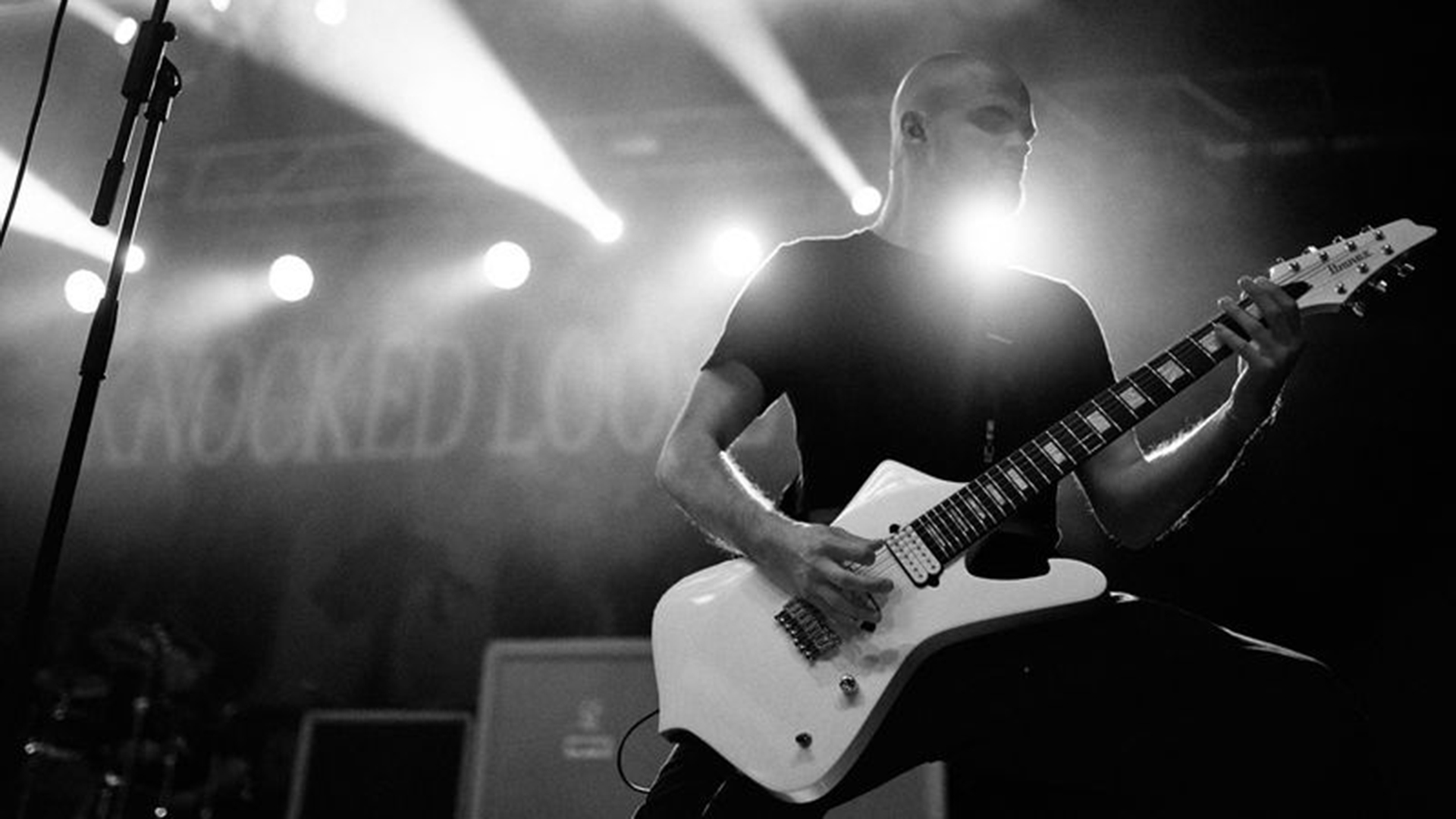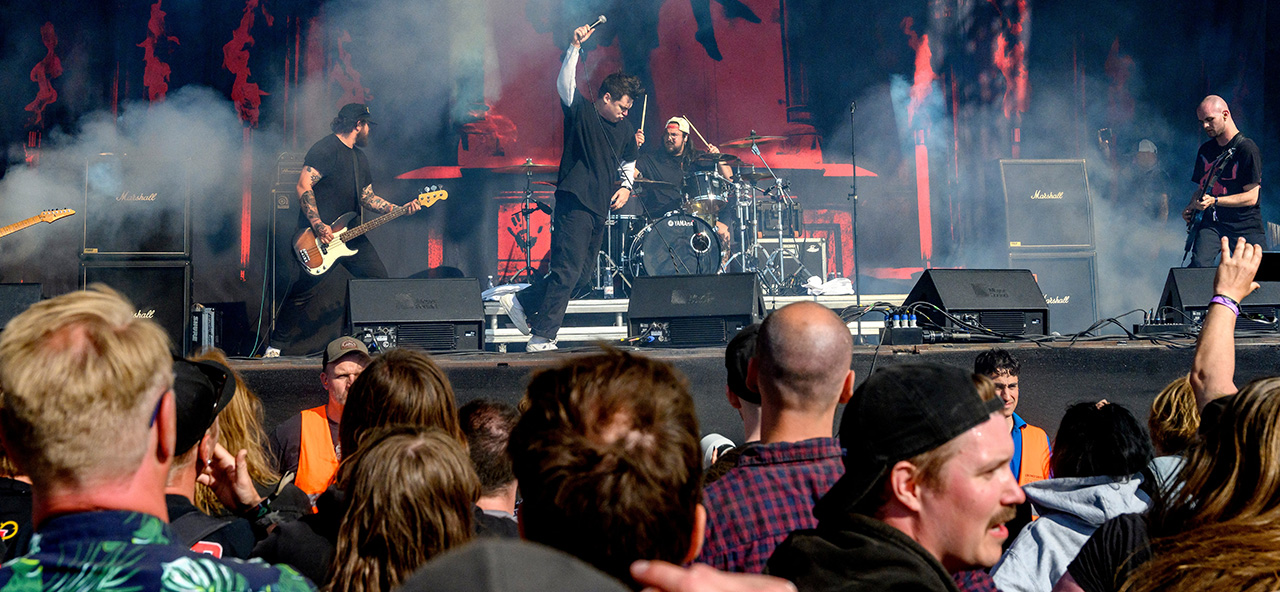“I care about my guitar’s wellbeing, but they’re meant to be sacrificed”: Knocked Loose’s Isaac Hale on how his new “hell tone”, a custom Ibanez and ancient mathematics helped the Slipknot support picks reinvent heavy guitar for 2024
Sticking with drop A and passive pickups, You Won’t Go Before You’re Supposed To sees Hale push his chain to its limit via a prototype Überschall amp – and he’s seeing the music reach unsuspecting new listeners

There’s an unwritten rule that says when bands grow, they should lose the sharpest edges of their sound in favour of something altogether more palatable. But Knocked Loose aren’t that kind of band.
Sure, the Kentucky outfit – who cut their teeth on a bone-breaking blend of hardcore, death and prog metal – are exploring more melodious avenues on third album You Won’t Go Before You’re Supposed To. But they’re still avenues you wouldn’t dare venture down on your own at night.
Taking the riskier route has paid off, though. First with their best album to date and more recently, when they were announced as the main support for Slipknot’s colossal 25th Anniversary tour. So how have they wound-up becoming the most essential heavy guitar band of 2024?
Coming off 2021’s ambitious concept EP, A Tear in the Fabric of Life, guitarist Isaac Hale says the band was left asking: “How do we one up that?”
Consequently, they decided to “write the catchiest and most melodic stuff we’ve ever done, but at the same time make it the heaviest, scariest thing people have ever heard.”
The anthemic violence of Don’t Reach for Me (one of our April Editor's Picks) is that mindset manifest, pushing the extremities of their brutality and accessibility with one breathless blow.
“The whole record is about balancing,” Hale underlines. “With that song, we wanted to look at the pop formula through an aggressive lens.
Get The Pick Newsletter
All the latest guitar news, interviews, lessons, reviews, deals and more, direct to your inbox!
“For Knocked Loose fans that didn’t want us to do a chorus, they’re gonna be pulled back in because we put seven fucking breakdowns in it.
“It’s aggressive in the beginning, but then it slows down and stays slow, which is rare for us. We felt like we were taking some chances, and it took a long time to get that right. It felt alien to do a song that wasn’t fast.”
The band remain locked in with their preferred seven-string drop A tuning – “we still feel we have a lot to explore with it” – but, in their quest to make a shit-your-pants heavy record, Hale ripped up the rule book when it came to tracking.
“We have 10 to 12 guitar tracks on most parts. There’s one layer we call the hell tone – you can barely hear the definition of the notes. It’s there for the pick noise and its scraping texture, and it gave us this wall of sound that we haven’t gotten before.
“Our chain has a Maxon OD9 Pro+ overdrive, a Way Huge Swollen Pickle fuzz, a Pitch Fork octave and another noise pedal. For some tracks, we’re only turning one of those one, but for the hell tone, they’re all on.”
He adds: “This record is meant to terrify you. A lot of my favourite mixes growing up were shitty, where it’s clipping and it’s so heavy that it felt like it was breaking whatever I was listening to it on.”
We spent a lot of time to make the record sound as dangerous as possible
The breakthrough in achieving the hell tone came from a rare prototype version of a Knocked Loose favourite amp, the Bogner Überschall.
“This time we got to use the Überschall Max – basically the Bogner Überschall turned up to 20. It had a whole different channel, which was so over the top it was like hell itself; you didn’t need to push it with a pedal. I knew it’s what this record needed.”
And yet they pushed it anyway, with the Maxon and the Swollen Pickle (which Hale calls “the best fuzz in the world”) making the hellscapes even more hideous.
“The Maxon is one of my favourite distortion pedals. Cannibal Corpse to use that one; it’s very integral to that low-tuned, super saturated and low-boosted sound.”
Complimenting the hell tone are tailored feedback screams, something Hale notes the band “spent a lot of time to make the record sound as dangerous as possible. We tried different fuzz pedals and approaching the cab in different ways to get different results.”
One thing I am strict and passionate about is passive pickups only. The juxtaposition between soft and heavy is really integral to the Knocked Loose sound
Much of the album is tracked with a nearly-stock Ibanez Iceman, save for its Seymour Duncan Sentient and Nazgul pickups in place of DiMarzio D-Activators.
“I wanted an exotic shape for this new era of Knocked Loose,” Hale explains, “but it still had to be comfortable. I want to feel in control of what I’m playing.
“I also love throwing my guitar around, so it needed to be light – I don't care about dings and scratches. I care about my guitar’s wellbeing, but they’re meant to be sacrificed.”
Since tracking wrapped, Ibanez have built him a custom Iceman, with its neck and body made thinner and lighter. That means he “lost a little bit of intonation but gained comfortability.”

He reports: “It has an old DiMarzio Fusion Edge pickup in there, which has more high-end to it, and an almost coil-tappy vibe. I can use it to add to my bite – I don't need to add as much treble to everything if I have the guitar doing it for me.”
Hale admits he’s fairly flexible when it comes to guitar specs, but insists that “one thing I am strict and passionate about is passive only. The juxtaposition between soft and heavy is really integral to the Knocked Loose sound; I don’t wanna feel constricted by an active pickup.”
I’m very driven by heavily syncopated parts… Meshuggah and Gojira are a big influence in that respect
Their new album might be brutally punchdrunk, but it concludes with their mathiest riff yet.
“The final breadown of Sit & Mourn is actually a Fibonacci sequence that me and [drummer] Kevin Kaine have been playing about with for years. It’s the number before it and the new number added together, so we go up to eight, and then we go back down to one.
“I’m very driven by heavily syncopated parts,” he continues. “There’s not as much flowing around the drums; it’s very much with everything. Meshuggah and Gojira are a big influence in that respect.
“Break Those Bones Whose Sinews Gave It Motion by Meshuggah – when that breakdown kicks in, that was the direct influence for the intro to Don’t Reach For Me.
“The End of Love? by Gojira is one of my favorite riffs of all time. It balances everything out perfectly. It is a breakdown, but there are pick scrapes and cool drum effects which really make it punch. Gojira are great at that – they have a very syncopated way of writing.”
There are rap shows that are more aggressive than any metal show – losing your mind isn’t specific to just metal
Last year, Knocked Loose raised eyebrows by playing Coachella. Yet it didn’t come as a huge surprise to Hale.
“Stuff from our world is getting pushed to the limelight a lot,” he says. “I think people are very interested in the sound and aesthetic of aggressive music right now.”
“There are rap shows that are more aggressive than any metal show – losing your mind isn’t specific to just metal. Our tent at Coachella reached capacity before we started and not all of those 7,000 people were Knocked Loose fans.

“Many heard rumblings that a metal band was playing and wanted to check it out. Because of that, a lot of people came away seeing something they’d never seen before – and they were either terrified or low-key connected with it.
“Maybe those people will start their own bands and zines and contribute to the scene. That’s what it’s all about: growing everything you know and making sure everything rises with the tide. I think that’s really important.”
- You Won’t Go Before You’re Supposed To is released on May 10 via Pure Noise. Knocked Loose commence a US tour the same day.
A freelance writer with a penchant for music that gets weird, Phil is a regular contributor to Prog, Guitar World, and Total Guitar magazines and is especially keen on shining a light on unknown artists. Outside of the journalism realm, you can find him writing angular riffs in progressive metal band, Prognosis, in which he slings an 8-string Strandberg Boden Original, churning that low string through a variety of tunings. He's also a published author and is currently penning his debut novel which chucks fantasy, mythology and humanity into a great big melting pot.
“Even the thought that Clapton might have seen a few seconds of my video feels surreal. But I’m truly honored”: Eric Clapton names Japanese neo-soul guitarist as one to watch
“You better be ready to prove it’s something you can do”: Giacomo Turra got exposed – but real guitar virtuosos are being wrongly accused of fakery, too











